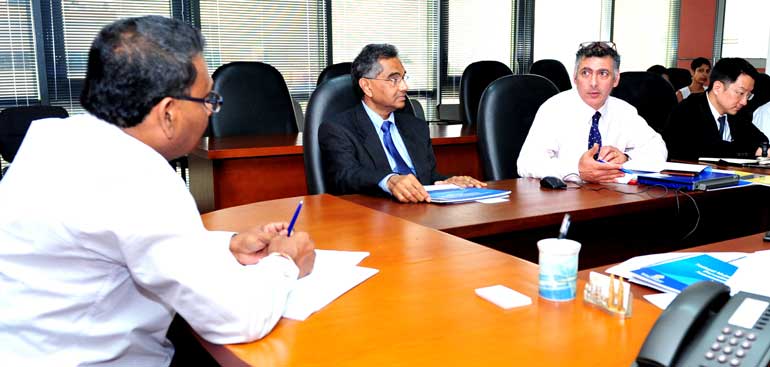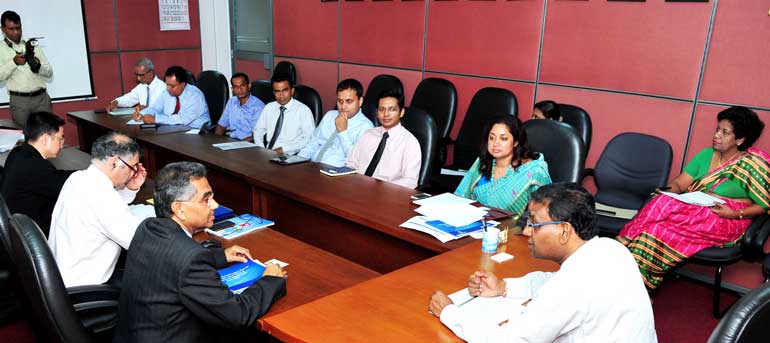Thursday Feb 19, 2026
Thursday Feb 19, 2026
Saturday, 10 October 2015 00:00 - - {{hitsCtrl.values.hits}}

EDB Chairman/CEO Bandula Egodage (left) leads the meeting with the members of visiting UN team, Jacob Kumaresan (Executive Director, WHO Office at the United Nations in New York), Nick Banatvala (Geneva-based Senior Adviser, WHO Secretariat for the UN Interagency Taskforce on Non-Ccommunicable Diseases), and Dr. Thaksapol Thammarangsi (Official – UN New Delhi) on 6 October at the EDB 
EDB Chairman/CEO Bandula Egodage (right) leads the meeting with the members of visiting UN team (at left) on 6 October at the EDB
With the latest UN health reports showing an unprecedented Non-Communicable Disease (NCD) death level in Sri Lanka, a special UN Taskforce that arrived in Colombo began working with the EDB to formulate national recommendations for the manufacturing and supply sectors.
Sri Lankan food and beverages manufacturers and exporters appear to be well compliant with global labelling standards. “Sri Lankan sugar consumption is at dangerous levels. Salt consumption too is way higher,” warned Dr. Thaksapol Thammarangsi (Official-WHO, New Delhi) on 6 October.
Thammarangsi, a member of the visiting Special UN Interagency Taskforce on Non-Communicable Diseases, was addressing members of Lankan private sector food and beverages manufacturers and exporters at the EDB.
Reps from such firms as Nestle Lanka, Hayleys PLC, Ceylon Biscuits Ltd., Smak Lanka Ltd., etc. met Jacob Kumaresan (Executive Director WHO Office at the United Nations in New York), Nick Banatvala (Geneva-based Senior Adviser-WHO-Secretariat for the UN Interagency Taskforce on Non-Communicable Diseases), and Dr. Thammarangsi of the UN NCD Taskforce at the session, which was also attended by EDB Chairman and CEO Bandula Egodage EDB Actg. DG Himali Jinadasa, EDB ADG Jeevany Siriwardene, medical doctors and top officials of the EDB.
According to WHO, deaths due to NCDs in Sri Lanka have rocketed and now claims 75% of total annual deaths in the country. The four main NCDs are cardiovascular disease, chronic respiratory disease, cancers and diabetes, while 28% of Lankans are victims of high blood pressure.
“Sugar, salt and fats are the three main dangers. Sri Lankan annual sugar consumption is at dangerous levels, three times higher than UN’s global recommended daily intakes. Salt consumption too is way higher than daily requirements, almost double. It is no surprise that we see high NCD deaths in Sri Lanka and these would increase if no action were taken in national health policies and manufacturers’ roles,” warned Dr. Thammarangsi. “Lifestyle change seem to have a marked effect on this development. It is time for Sri Lanka to make efforts.”
Jacob Kumaresan (Executive Director WHO Office at the United Nations in New York, delegation head) said: “People’s lifestyles have changed and for adoption of healthy lifestyle, environment too has to be right-content is important, and we need to make recommendations to Sri Lanka in the context of the right environment. We are here to find out about the environment here and this is the guiding principle in which we discuss with various partners in Sri Lanka such as the private sector food and beverage processing firms here today. Food marketers need to show the contents in their labels correctly. Appropriate warning should be displayed.”
Nick Banatvala (Geneva-based Senior Adviser-WHO-Secretariat for the UN Interagency Taskforce on Non-communicable Diseases) advocated: “This is a Joint UN Taskforce Mission looking at Non-Communicable Diseases in Sri Lanka. This is the first such mission to Sri Lanka and one from its eight such global missions. Eleven UN agencies have come together in this session to tackle the big issue at the moment, which is Non-Communicable Diseases (NCD). The reason for engaging with the exporters and the private sector is that we believe that they have a very important role to play in contributing to Lankan national efforts on NCDs. For example, we know that the private sector provides vast amounts of food, beverage and tobacco and also the key in producing and supplying alcohol that Sri Lanka consumes. Together, these supplies also contribute to NCDs. The private sector in food and beverages is crucial when it comes to NCDs. It is essential therefore for UN to engage with exporters and private sector including fast food suppliers and SMEs.”
“Sri Lankan food and beverages exporters are good contributors to our export earnings and their export revenues have been increasing steadily,” said EDB Chairman and CEO Bandula Egodage, addressing the session. “The Sri Lankan palate is used to high sugar use. It’s traditional. A big SME and micro sector is involved in these types of foods and confectionaries. In urban areas, ready to eat food volumes are higher than general processed food and beverages and these need to be considered when the UN makes its recommendations for Sri Lanka.”
The exporters present on 6 October stressed that almost all their products, packaging and labelling were on par with international standards. “We all are well aware of the standards that we need to adhere to and we comply even when supplying to the Lankan market. When we fill export orders, the situation may slightly differ since we have to supply to the recipe given by the buyer, over which we have no control. It is important for the UN and the Government to create awareness for the SME food sector, fast food sector and street foods since these sectors directly link to consumers,” the exporters stated.
The EDB expects to continue the dialogue process initiated by the UN Taskforce on 6 October.
In 2014, Lankan food, feed, beverages and tobacco exports increased by 14% to $317 m from 2013 and revenue from processed vegetables and fruits exports too surged to $ 16 m from 2013’s $13 m.